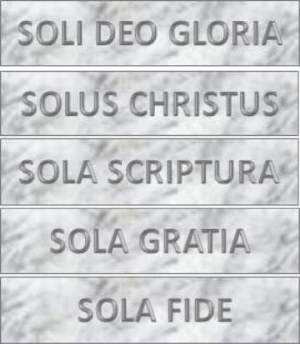EXPLORING THE WORD
Christ Alone (Solus Christus)
CG

If you will recall, this was the material cause of the Reformation. Martin Luther, and those who followed after him, argued that a man (a person) is justified by grace alone through faith alone in Christ alone to God alone be the glory! We've already looked at "grace alone" and "faith alone." What we need to understand is what role Christ plays in our justification before God.
When we say we are justified "by grace," what that means is that salvation is a gracious gift of God that is freely provided. However, grace doesn't justify us, it simply denotes that we don't have to do anything to be justified. Additionally, when we say we are justified by grace "through faith," that means that faith is the means through which we appropriate justification. Again, faith doesn't justify us, rather we are justified through our faith. The foundation of our justification rests on Christ alone. It is the person and work of Christ that justifies. What Christ did is then graciously given to those who respond by faith. So what did Christ do that earns justification for God's people? Reformed theologians answer this question by referring to the active obedience of Christ and the passive obedience of Christ. The active obedience of Christ refers to the perfect obedience of Christ to God's law. Jesus Christ lived a life of sinless perfection in full accordance to God's holy law. Christ, and Christ alone, perfectly fulfilled all righteousness and earn merit before God. The passive obedience of Christ refers to his death on the cross as an atonement for the sins of his people. Through the passive obedience of Christ, our sins are paid for and the sin debt we have before God is erased. Through the active obedience of Christ, the perfect righteousness that Christ merits before God is imputed to us by grace through faith. Therefore, we are justified before God by the perfect righteousness of Christ (an alien -- i.e., outside of us – righteousness) being credited to our account. When God looks at us, he sees the righteousness of Christ, not our sin (which has been canceled).
All of this speaks of Christ's mediatorial role. Jesus Christ serves as the only mediator between God and man (1 Timothy 2:5). We cannot earn our way into heaven, only Christ can. We cannot stand before God "naked and unclothed," but only when clothed in the perfect righteousness of Christ. Christ serves as the mediator making reconciliation between a holy God and sinful man. This idea of Christ being the only mediator between God and man is opposed to much Roman Catholic teaching on justification and merit.
Roman Catholicism teaches that man can perform meritorious good works that result in our ultimate justification before God. To be fair, Catholicism does teach that God enables man to perform these good works, therefore there is a gracious element present. But the main difference between Protestantism and Catholicism is that Protestantism teaches that our good works are the result of us having already been saved; they flow from our justification. Quite the opposite is true in Catholicism. The good works that God enables us to perform work toward our justification.
Furthermore, in Catholicism, the church essentially usurps the mediatorial work of Christ. The benefits of Christ's sacrifice are meeted out through the sacraments of the church. Instead of the believer resting in the finished work of Christ by faith, in Catholicism, he must perpetually avail himself of the holy sacraments, perform good works to merit grace and do pennance to make satisfaction for sin. In the final analysis, this all may not be enough since there is a good chance that the Catholic will spend some time in purgatory purging himself of any remaining venial sin. All of this stand against the perfect, finished work of Christ who alone merits salvation for his people to be received through faith. What were the words uttered by Christ from the cross? "It is finished" (John 19:30).
Our right standing before God is through the active and passive obedience of Jesus Chrsit, the only mediator between God and man. It is in Christ alone that we stand justified before a holy God.
Soli Deo Gloria!
CFG
The Series:
Faith Alone (Sola Fide): Rome calls "faith alone" a legal fiction; is it something more?
Scripture Alone (Sola Scriptura): Is Scripture really the sole source of inspired authority?
Grace Alone (Sola Gratia): What does God do and what does man do in salvation?
Christ Alone (Solus Christus): Is Christ or the church mediator between God and man?
The Glory of God Alone (Soli Deo Gloria): Does man do nothing to merit his salvation?
comments powered by Disqus
Republished 5-20-2013

